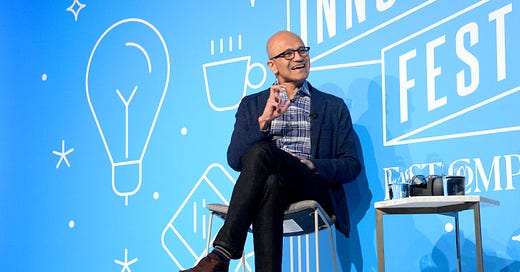Microsoft Scares Google, Coatue Is Buying Again & Masa's on the Hook for $5.1 Billion
A look at the week that was. Plus, some Newcomer sponsorship opportunities.
Before I get into this week’s headlines, a couple of items to flag for Newcomer readers and potential sponsors:
I’m planning to co-host an invite-only AI conference with my friends at Volley on Thursday, March 30 in San Francisco’s Hayes Valley. We’ve got some of the top artificial intelligence startups and investors scheduled to speak. We’ll open up ticket sales later this month. (I’ll give as much priority as I can to paying Newcomer subscribers but tickets will be extremely limited.) I’m looking for a few sponsors for the event so reach out if that might be up your alley.
Second, the podcast is on a break this month as I prepare for a re-launch in March. I’m lining up some stellar guests for the revamped podcast. I have a very limited amount of sponsorship opportunities for the podcast. So if you have guest recommendations or are interested in a sponsorship, reach out.
You can reach us at newcomer@newcomer.co
This week Microsoft put the fear of God into Google.
Microsoft is diving head first into artificial intelligence, pairing Bing search with OpenAI’s technology. Google is trying to play catchup and the company’s stock is suffering because of it. If Microsoft’s Bing makes even the slightest of market share gains against Google, it could mean many billions in revenue flowing from Google to Microsoft.
Microsoft CEO Satya Nadella seems to be reveling in the competitive dynamic.

Bing (Yes, Bing) Just Made Search Interesting Again | NYT
Microsoft released the new Bing, which is powered by artificial intelligence software from OpenAI, the maker of the popular chatbot ChatGPT, with great fanfare at an event at the company’s headquarters on Tuesday. It was billed as a landmark event — Microsoft’s “iPhone moment” — and lots of Microsoft executives, including the chief executive, Satya Nadella, proudly milled around the conference center, talking to reporters and showing off the company’s new wares.
But the real star was Bing itself or, rather, the artificial intelligence technology that has been plugged into Bing to help answer users’ questions and chat with them about any topic imaginable. (Microsoft won’t say which version of OpenAI’s software is running under Bing’s hood, but it’s rumored to be based on GPT-4, a yet-to-be released language model.)


Alphabet Falls Most in Three Months on Bard Accuracy Concerns | Reuters
LONDON, Feb 8 (Reuters) - Alphabet Inc (GOOGL.O) lost $100 billion in market value on Wednesday after its new chatbot shared inaccurate information in a promotional video and a company event failed to dazzle, feeding worries that the Google parent is losing ground to rival Microsoft Corp (MSFT.O).
Alphabet shares slid as much as 9% during regular trading with volumes nearly three times the 50-day moving average. They pared losses after hours and were roughly flat. The stock had lost 40% of its value last year but rallied 15% since the beginning of this year, excluding Wednesday's losses.
Reuters was first to point out an error in Google's advertisement for chatbot Bard, which debuted on Monday, about which satellite first took pictures of a planet outside the Earth’s solar system.
At the same time Microsoft seems to be leaning into artificial intelligence, it’s leaning out of the metaverse.
Microsoft Kills Its Industrial Metaverse Team After 4 Months | The Information
In a surprising reversal, Microsoft has killed a team it formed four months ago to help customers use the metaverse in industrial settings, according to a person with direct knowledge of the matter. The group’s roughly 100 employees have all been laid off, the person said.
Microsoft created its Industrial Metaverse Core team in October to help build software interfaces for operating the control systems behind electrical power plants, industrial robotics and transportation networks, The Information was first to report. The team, primarily composed of a group known internally as Project Bonsai, fell victim to Microsoft’s plan announced last month to lay off 10,000 employees, or about 4.5% of its workforce.






